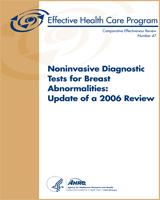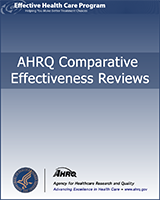NCBI Bookshelf. A service of the National Library of Medicine, National Institutes of Health.
This publication is provided for historical reference only and the information may be out of date.
Excerpt
Since the advent of mammography and clinical breast examination, many asymptomatic women have had an abnormal finding. Typically, suspicious lesions are evaluated with tissue biopsy, either by excision or by needle sampling. However, only a low percentage of women undergoing biopsy actually have cancer, suggesting that many of them could avoid biopsy if a non-invasive diagnostic test were available that could, with high sensitivity, rule out malignancy. Several technologies have been proposed for this purpose, yet the outcomes of using these non-invasive diagnostic technologies remains unclear. The ultimate purpose of this evaluation is to help patients, policymakers, and clinicians determine when it is appropriate to use these non-invasive technologies.
Contents
Prepared for: Agency for Healthcare Research and Quality, U.S. Department of Health and Human Services.1 Contract No. 290-02-0019. Prepared by: ECRI Evidence-based Practice Center, Plymouth Meeting, Pennsylvania.
Suggested citation:
Bruening W, Launders J, Pinkney N, Kostinsky H, Schoelles K, Turkelson C. Effectiveness of Noninvasive Diagnostic Tests for Breast Abnormalities. Comparative Effectiveness Review No. 2. (Prepared by ECRI Evidence-based Practice Center under Contract No. 290-02-0019.) Rockville, MD: Agency for Healthcare Research and Quality. February 2006. Available at: http://effectivehealthcare.ahrq.gov/healthInfo.cfm?infotype=all&reptype=allfinal.
This report is based on research conducted by the ECRI Evidence-based Practice Center (EPC) under contract to the Agency for Healthcare Research and Quality (AHRQ), Rockville, MD (Contract No. 290-02-0019). The findings and conclusions in this document are those of the authors, who are responsible for its contents; the findings and conclusions do not necessarily represent the views of AHRQ. Therefore, no statement in this report should be construed as an official position of AHRQ or the U.S. Department of Health and Human Services.
The information in this report is intended to help health care decisionmakers, patients and clinicians, health system leaders, and policymakers make well-informed decisions and thereby improve the quality of health care services. This report is not intended to be a substitute for the application of clinical judgment. Anyone who makes decisions concerning the provision of clinical care should consider this report in the same way as any medical reference and in conjunction with all other pertinent information, i.e., in the context of available resources and circumstances presented by individual patients.
This report may be used, in whole or in part, as the basis for development of clinical practice guidelines and other quality enhancement tools, or as a basis for reimbursement and coverage policies. Neither AHRQ's nor the U.S. Department of Health and Human Services' endorsement of such derivative products may be stated or implied.
- 1
540 Gaither Road, Rockville, MD 20850. www
.ahrq.gov
- Predictive value of breast lesions of "uncertain malignant potential" and "suspicious for malignancy" determined by needle core biopsy.[Ann Surg Oncol. 2007]Predictive value of breast lesions of "uncertain malignant potential" and "suspicious for malignancy" determined by needle core biopsy.Dillon MF, McDermott EW, Hill AD, O'Doherty A, O'Higgins N, Quinn CM. Ann Surg Oncol. 2007 Feb; 14(2):704-11. Epub 2006 Dec 7.
- Underestimation of the presence of breast carcinoma in papillary lesions initially diagnosed at core-needle biopsy.[Radiology. 2007]Underestimation of the presence of breast carcinoma in papillary lesions initially diagnosed at core-needle biopsy.Sydnor MK, Wilson JD, Hijaz TA, Massey HD, Shaw de Paredes ES. Radiology. 2007 Jan; 242(1):58-62. Epub 2006 Nov 7.
- [Preoperative needle biopsy: an improvement in palpable breast tumors with strong indications for malignancy].[Ned Tijdschr Geneeskd. 1996][Preoperative needle biopsy: an improvement in palpable breast tumors with strong indications for malignancy].Zonderland HM, van de Velde CJ, van de Vijver MJ, Hermans J. Ned Tijdschr Geneeskd. 1996 Sep 28; 140(39):1952-6.
- Review Supplemental Screening for Breast Cancer in Women With Dense Breasts: A Systematic Review for the U.S. Preventive Service Task Force[ 2016]Review Supplemental Screening for Breast Cancer in Women With Dense Breasts: A Systematic Review for the U.S. Preventive Service Task ForceMelnikow J, Fenton JJ, Whitlock EP, Miglioretti DL, Weyrich MS, Thompson JH, Shah K. 2016 Jan
- Review Evaluation of palpable breast masses.[Am Fam Physician. 2005]Review Evaluation of palpable breast masses.Klein S. Am Fam Physician. 2005 May 1; 71(9):1731-8.
- Effectiveness of Noninvasive Diagnostic Tests for Breast AbnormalitiesEffectiveness of Noninvasive Diagnostic Tests for Breast Abnormalities
- unnamed protein product [Mus musculus]unnamed protein product [Mus musculus]gi|74195451|dbj|BAE39544.1|Protein
- recombination activating protein 1, partial [Neoromicia somalicus]recombination activating protein 1, partial [Neoromicia somalicus]gi|397713634|gb|AFO60417.1|Protein
- stonin 2, partial [Odontophrynus occidentalis]stonin 2, partial [Odontophrynus occidentalis]gi|1304834274|gb|AUD52412.1|Protein
- Caenorhabditis elegans Non-coding transcript of protein-coding gene F40E3.6b (F4...Caenorhabditis elegans Non-coding transcript of protein-coding gene F40E3.6b (F40E3.6), miscRNAgi|808355163|ref|NR_131366.1|Nucleotide
Your browsing activity is empty.
Activity recording is turned off.
See more...

